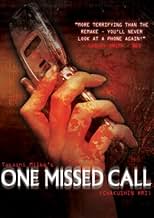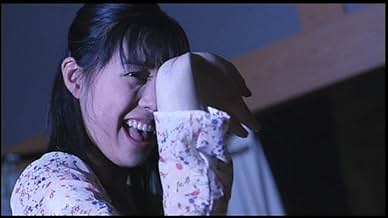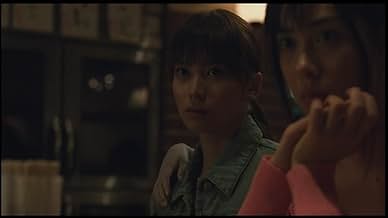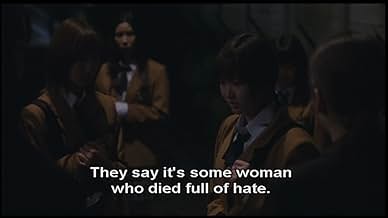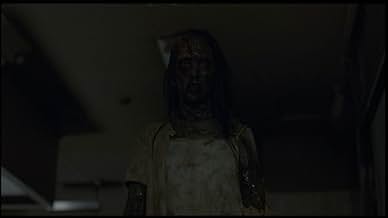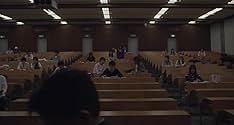Yumi tries to assuage the fears of a friend, Yoko, who has received a disturbing voice mail from herself. In the message, Yoko screams while chatting with Yumi. Three days later, the exact c... Read allYumi tries to assuage the fears of a friend, Yoko, who has received a disturbing voice mail from herself. In the message, Yoko screams while chatting with Yumi. Three days later, the exact call plays out, and Yoko dies.Yumi tries to assuage the fears of a friend, Yoko, who has received a disturbing voice mail from herself. In the message, Yoko screams while chatting with Yumi. Three days later, the exact call plays out, and Yoko dies.
- Director
- Writers
- Stars
- Director
- Writers
- All cast & crew
- Production, box office & more at IMDbPro
Featured reviews
Chakushin ari is another ghost tale but it gets a bit special when Miike-san is in charge of things.
First, I strongly disagree with some other posters at the board who weren't bothered by Chakushin ari facing a Hollywood remake. Why can't Hollywood keep their dirty fingers away when they fail in their own miserable creativity. Anyhow...
I've just started to dig deeper into the works of Takashi Miike and I have no problems admitting that his movies are awesome. Chakushin ari is another ghost tale but it gets a bit special when Miike-san is in charge of things. What you get in Chakushin ari is, besides the beautiful surroundings and awesome camera work, tension, thrills and a plot which does quite good for being in this genre. It has its moments of originality and compared to the works of Hideo Nakata, I'd say Miike here accomplish a heavier load of tension throughout the whole movie, while Nakata's movies have tension coming in waves, sort of.
I have really nothing to whine about here or rant at. The actors are doing a good job and the piece kept me interested throughout the entire playtime. Thumbs up.
I've just started to dig deeper into the works of Takashi Miike and I have no problems admitting that his movies are awesome. Chakushin ari is another ghost tale but it gets a bit special when Miike-san is in charge of things. What you get in Chakushin ari is, besides the beautiful surroundings and awesome camera work, tension, thrills and a plot which does quite good for being in this genre. It has its moments of originality and compared to the works of Hideo Nakata, I'd say Miike here accomplish a heavier load of tension throughout the whole movie, while Nakata's movies have tension coming in waves, sort of.
I have really nothing to whine about here or rant at. The actors are doing a good job and the piece kept me interested throughout the entire playtime. Thumbs up.
While in a bar with her friends, the teenager Yoko Okazaki (Anna Nagata) receives a call in her cellular with a voice mail from the future telling the date and time when she would die. On the next day, Yumi overhears a group of students talking about the urban legend that people connected in the address book of cellular are mysteriously receiving phone calls with date and time of their death in the near future. In the precise informed hour, Yoko is attacked by a supernatural force in a train station while talking to her friend Yumi Nakamura (Kou Shibasaki) by phone and dies with severed arm and leg. Yumi seeks out Kioto's boyfriend Kenji Kawai (Atsushi Ida), who also received a call, and witnesses his death in an elevator shaft. When her roommate Natsumi Konishi (Kazue Fukiishi) receives a call, Yoko befriends Hiroshi Yamashita (Shin'ichi Tsutsumi), who tells her that his sister Ritsuko (Azusa) that worked in the Child Guidance Center with abused children was the first victim of the phone call. While in the hospital, Yumi hears an asthma pump and recalls that she heard the same noise when Kenji died. They decide to investigate victims of asthma in the hospital and find the name of Marie Mizunuma and her daughters Mimiko and Nanako. They search the family together trying to save Natsumi from her fate.
"Chakushin Ari" is scary like most of the Asian horror movies, and has a promising beginning supported by a great acting and a good plot. However, the last quarter of the movie is confused, not clear, needing interpretation; therefore, the screenplay writer Minako Daira or the cult director Takashi Miike or both failed since they were not able to transmit a clear conclusion of the story to the audience. I glanced in IMDb the most different interpretations for the end of the story to ratify my opinion. My vote is six.
Title (Brazil): "Ligação Perdida" ("Missed Call")
"Chakushin Ari" is scary like most of the Asian horror movies, and has a promising beginning supported by a great acting and a good plot. However, the last quarter of the movie is confused, not clear, needing interpretation; therefore, the screenplay writer Minako Daira or the cult director Takashi Miike or both failed since they were not able to transmit a clear conclusion of the story to the audience. I glanced in IMDb the most different interpretations for the end of the story to ratify my opinion. My vote is six.
Title (Brazil): "Ligação Perdida" ("Missed Call")
10gizoune7
i read a lot of bad reviews about this fantastic movie, so i watched it without even expecting something good.Of course i was positively surprised,the actors are very good : very few American actress knows how to express pure terror on they're faces as well as a Japanese actress.Miike success in creating an intense and creepy mood that follows you all the way till the end credits.
o.k. so the story is not very original,if you have seen Ju-on, Ringu or Dark water there is nothing new here. it's another Japanese movie with a "grudge" (grudge: curse that happens when someone "most of the times a girl" dies in a tragic or horrible death,then the girl return from the dead to kill,usually grudges have long dark hair covering they're faces) but the ghost or grudge in "one missed call" is a lot more scary than Sadako in ringu or even the one in ju-on and there is a lot of murders going on from the beginning to the end. It's definitely not slow paced like dark water and a lot more entertaining.
But if your like me, when you watch a zombie movie you expect zombies,if you watch a killer movie you expect killings so if you watch a Japanese horror movie expect a grudge cause it's a part of the Japanese mythology so don't go crying out loud that this movie sucks because it's a pale imitation of ringu and ju-on, IT IS NOT!!!!
so, i give this movie 10/10 for three reason: 1: a lot of good scares 2: a very effective and disgusting grudge 3: entertaining from opening credits to the end
o.k. so the story is not very original,if you have seen Ju-on, Ringu or Dark water there is nothing new here. it's another Japanese movie with a "grudge" (grudge: curse that happens when someone "most of the times a girl" dies in a tragic or horrible death,then the girl return from the dead to kill,usually grudges have long dark hair covering they're faces) but the ghost or grudge in "one missed call" is a lot more scary than Sadako in ringu or even the one in ju-on and there is a lot of murders going on from the beginning to the end. It's definitely not slow paced like dark water and a lot more entertaining.
But if your like me, when you watch a zombie movie you expect zombies,if you watch a killer movie you expect killings so if you watch a Japanese horror movie expect a grudge cause it's a part of the Japanese mythology so don't go crying out loud that this movie sucks because it's a pale imitation of ringu and ju-on, IT IS NOT!!!!
so, i give this movie 10/10 for three reason: 1: a lot of good scares 2: a very effective and disgusting grudge 3: entertaining from opening credits to the end
This just might be the most interesting psychological drama that I've seen since Miike's own masterpiece Audition (1999), and one that it seems has sadly been misinterpreted by many critics and viewers as being a work of simple J-Horror by numbers. Though it has elements of this, the characteristics of J-Horror, which are very much rooted in standard social and spiritual taboos that many Japanese people take incredibly seriously, are used as window dressing here, intended to distract the audience from the more important and subtle ideas at work behind the surface of the narrative.
It certainly isn't a pastiche or a spoof as some viewers have indicated, though you could argue that it works on a certain satirical level, with the odd hint of benign humour that we've come to expect from Miike woven throughout. However, judging from much of the stylistic tone of the film, with its deeper allusions to child abuse and the murky and alienated tone that the director attaches to it, I honestly can't imagine that this is meant to be laughed at. Those who claim that the film is a comedy or a spoof are more likely to be Miike fans that are unfamiliar with the broader aspects of his work and the way in which he puts his films together; instead judging his films simply on the shock-value and tongue-in-cheek triviality of projects like Ichi the Killer (2002) and Dead or Alive (1999). Yes, he does accept any film that is offered to him, and more often than not chooses work that he feels he can do something interesting with; experimenting with the form and content and occasionally adding his own touches that are often subversive and somewhat attention seeking, but he always has in mind an approach that best suits the material.
He doesn't condescend to his work; there's no cynicism here. As ever, Miike is fulfilling the wishes of his producer whilst simultaneously bringing something else to the film that may have been missed by a lesser filmmaker, more interested in the superficial quality of the story. In this case, a sly comment on the media and how it manipulates tragedy for profit; turning horror and pain into spectacle. It also continues the theme of lost youth; something quite prevalent in Japanese cinema, with films like Battle Royale (2000), Visitor Q (2001), Pulse (2001) and All About Lily Chou-Chou (2002) documenting the recent struggles in both social environments and education, with the idea of a generation of Japanese youth overwhelmed by expectations of family and society and cast adrift in such a way as to leave them ultimately more venerable to a greater evil (be it drugs, gang violence, suicide or crime). It's all done metaphorically of course - with the J-horror elements used to mask these ideas - though certainly, in many of the scenes, we see characters, kids even, isolated and with no one to turn to.
Think about the presentation of both the film and the narrative; the absence of responsible adults creating a ghost world that these kids drift in and out of, turning only to each other for solace. The creation of a nocturnal world where school children hang out on railway bridges in the early hours of the morning, watching scenes of abject horror in a way that suggests tragic familiarity. The way that the background characters - the everyday people on the street - huddle under umbrellas watching a televised exorcism in the centre of Shinjuku completely cut off and detached from everything that is happening, becoming an almost representation of the audience even; eating up the pain and suffering as dismissible entertainment and completely missing the personal horror and exploitation of the abuse itself. Likewise, look at the scenes shot during the day. The streets are mostly empty, save for the presence of the adult media, the police (who have a complicated role within the film) and the students who are at the centre of the whole thing.
Those claiming that this is a comedy seem uneducated when it comes to Miike and his work; looking for the vapid cartoon character and his torrents of gore and depraved sex, and not the finely nuanced filmmaker who gave us excellent, multi-layered works like Shinjuku Triad Society (1995), Rainy Dog (1997), The Bird People in China (1998), Audition (1999), Dead or Alive: Birds (2000) and Gozu (2003). As a horror film, this is effective. The scenes in the abandoned hospital, although clichéd, work incredibly well at ramping the tension. However, there's more to the film once we dig beneath the surface. The final act of the film takes place on at least three different levels; taking in the real, the imagined and the abstracted memory of both. The way Miike brings the various elements together - using stylised production design and skewed perspectives - creates a hall of mirrors like sense of abstraction familiar from the final act of Audition. Think about it. Is Gozu simply an absurd spoof on the latent homosexuality of the Yakuza sub-genre, or is there a more interest sub-textual argument about identity and gender being woven within? One Missed Call works on a similar level.
Those who make the effort to watch Miike's work will know that there is always much more to his films than it initially seems, though you really have to work at it. To suggest that this is a spoof because you fail to appreciate the subtle, sub-textual storytelling and ask simply for mere cartoon-like abstraction is a discredit to a great filmmaker and those of us familiar with Miike's work beyond that of Ichi the Killer. With One Missed Call, Miike gives us a multi-layered film; shocking and satirical in equal measures and tied to a truly tragic depiction of loss, abuse and alienated youth.
It certainly isn't a pastiche or a spoof as some viewers have indicated, though you could argue that it works on a certain satirical level, with the odd hint of benign humour that we've come to expect from Miike woven throughout. However, judging from much of the stylistic tone of the film, with its deeper allusions to child abuse and the murky and alienated tone that the director attaches to it, I honestly can't imagine that this is meant to be laughed at. Those who claim that the film is a comedy or a spoof are more likely to be Miike fans that are unfamiliar with the broader aspects of his work and the way in which he puts his films together; instead judging his films simply on the shock-value and tongue-in-cheek triviality of projects like Ichi the Killer (2002) and Dead or Alive (1999). Yes, he does accept any film that is offered to him, and more often than not chooses work that he feels he can do something interesting with; experimenting with the form and content and occasionally adding his own touches that are often subversive and somewhat attention seeking, but he always has in mind an approach that best suits the material.
He doesn't condescend to his work; there's no cynicism here. As ever, Miike is fulfilling the wishes of his producer whilst simultaneously bringing something else to the film that may have been missed by a lesser filmmaker, more interested in the superficial quality of the story. In this case, a sly comment on the media and how it manipulates tragedy for profit; turning horror and pain into spectacle. It also continues the theme of lost youth; something quite prevalent in Japanese cinema, with films like Battle Royale (2000), Visitor Q (2001), Pulse (2001) and All About Lily Chou-Chou (2002) documenting the recent struggles in both social environments and education, with the idea of a generation of Japanese youth overwhelmed by expectations of family and society and cast adrift in such a way as to leave them ultimately more venerable to a greater evil (be it drugs, gang violence, suicide or crime). It's all done metaphorically of course - with the J-horror elements used to mask these ideas - though certainly, in many of the scenes, we see characters, kids even, isolated and with no one to turn to.
Think about the presentation of both the film and the narrative; the absence of responsible adults creating a ghost world that these kids drift in and out of, turning only to each other for solace. The creation of a nocturnal world where school children hang out on railway bridges in the early hours of the morning, watching scenes of abject horror in a way that suggests tragic familiarity. The way that the background characters - the everyday people on the street - huddle under umbrellas watching a televised exorcism in the centre of Shinjuku completely cut off and detached from everything that is happening, becoming an almost representation of the audience even; eating up the pain and suffering as dismissible entertainment and completely missing the personal horror and exploitation of the abuse itself. Likewise, look at the scenes shot during the day. The streets are mostly empty, save for the presence of the adult media, the police (who have a complicated role within the film) and the students who are at the centre of the whole thing.
Those claiming that this is a comedy seem uneducated when it comes to Miike and his work; looking for the vapid cartoon character and his torrents of gore and depraved sex, and not the finely nuanced filmmaker who gave us excellent, multi-layered works like Shinjuku Triad Society (1995), Rainy Dog (1997), The Bird People in China (1998), Audition (1999), Dead or Alive: Birds (2000) and Gozu (2003). As a horror film, this is effective. The scenes in the abandoned hospital, although clichéd, work incredibly well at ramping the tension. However, there's more to the film once we dig beneath the surface. The final act of the film takes place on at least three different levels; taking in the real, the imagined and the abstracted memory of both. The way Miike brings the various elements together - using stylised production design and skewed perspectives - creates a hall of mirrors like sense of abstraction familiar from the final act of Audition. Think about it. Is Gozu simply an absurd spoof on the latent homosexuality of the Yakuza sub-genre, or is there a more interest sub-textual argument about identity and gender being woven within? One Missed Call works on a similar level.
Those who make the effort to watch Miike's work will know that there is always much more to his films than it initially seems, though you really have to work at it. To suggest that this is a spoof because you fail to appreciate the subtle, sub-textual storytelling and ask simply for mere cartoon-like abstraction is a discredit to a great filmmaker and those of us familiar with Miike's work beyond that of Ichi the Killer. With One Missed Call, Miike gives us a multi-layered film; shocking and satirical in equal measures and tied to a truly tragic depiction of loss, abuse and alienated youth.
This movie has a more than interesting and good premise and it also has a real promising beginning but as the movie and its story start to progress more the movie actually gets worse and starts to drag and become overlong.
Japanese horror movies are well known and appreciated over the world now days, due to the global success of several genre pieces, with of course "Ringu" as the best example of this. And even though these movies are always well made and good looking ones, there are often more or less the same. Aside from its premises, they are often hardly original in their execution, with the exception of an occasional memorable and effective sequences. And yes, this movie is also pretty much more of the same. It's welcome for the fans of it but it's just offering too little originality, which makes this a movie you'll easily forget.
This is a pretty mainstream movie for normal Takashi Miike standards. Guess he needs to make these type of movies, every once in a while, before he can continue and finance his other movie projects, that are less mainstream and just plain odd and weird with their style and approach. But it are still the movies he is known for and also most appreciated more by people all over the world. I'm not a fan of just all of his movies but often his weirdness, extreme graphic violence and humorous approach of it all can still appeal to me and make his movies something unique and enjoyable for me. But this movie really doesn't has any of that. It's made in the same style as any other popular Japanese horror movie, which means that this movie will probably also disappoint most Takashi Miike lovers.
Thing with this movie is that it has an alright story and main premise in its beginning but the more it all progresses the harder it gets to understand and the less interest you'll keep in this movie. It's the reason why the movie feels like it's dragging at points and feels also certainly overlong. This is a movie that should at least had been 20 minutes shorter really.
This also certainly goes at the expense of the horror and mystery of the movie. Horror-wise this movie is certainly disappointing in what it is offering. Again, because it's being nothing too original but also because the movie it's story-telling doesn't really get you involved with things and therefore a lot of the mystery and tension dies off pretty quick already. It also doesn't help that the movie becomes more and more confusing toward its ending.
But overall, this movie still does a lot of things well. It's certainly not any worse than the average Japanese horror entry and despite all of its problems, I still consider this a watchable movie.
6/10
http://bobafett1138.blogspot.com/
Japanese horror movies are well known and appreciated over the world now days, due to the global success of several genre pieces, with of course "Ringu" as the best example of this. And even though these movies are always well made and good looking ones, there are often more or less the same. Aside from its premises, they are often hardly original in their execution, with the exception of an occasional memorable and effective sequences. And yes, this movie is also pretty much more of the same. It's welcome for the fans of it but it's just offering too little originality, which makes this a movie you'll easily forget.
This is a pretty mainstream movie for normal Takashi Miike standards. Guess he needs to make these type of movies, every once in a while, before he can continue and finance his other movie projects, that are less mainstream and just plain odd and weird with their style and approach. But it are still the movies he is known for and also most appreciated more by people all over the world. I'm not a fan of just all of his movies but often his weirdness, extreme graphic violence and humorous approach of it all can still appeal to me and make his movies something unique and enjoyable for me. But this movie really doesn't has any of that. It's made in the same style as any other popular Japanese horror movie, which means that this movie will probably also disappoint most Takashi Miike lovers.
Thing with this movie is that it has an alright story and main premise in its beginning but the more it all progresses the harder it gets to understand and the less interest you'll keep in this movie. It's the reason why the movie feels like it's dragging at points and feels also certainly overlong. This is a movie that should at least had been 20 minutes shorter really.
This also certainly goes at the expense of the horror and mystery of the movie. Horror-wise this movie is certainly disappointing in what it is offering. Again, because it's being nothing too original but also because the movie it's story-telling doesn't really get you involved with things and therefore a lot of the mystery and tension dies off pretty quick already. It also doesn't help that the movie becomes more and more confusing toward its ending.
But overall, this movie still does a lot of things well. It's certainly not any worse than the average Japanese horror entry and despite all of its problems, I still consider this a watchable movie.
6/10
http://bobafett1138.blogspot.com/
Did you know
- TriviaDuring the opening credit sequence, one of the cell phone ring-tones is the theme song from an earlier Takashi Miike film, Gozu (2003).
- GoofsYumi arrives at the abandoned hospital at 6:45 p.m. on April 24, and it's nighttime. On that date, sunset in Japan ranges from around 6:20 p.m. Japan Standard Time in the east, near Tokyo, to around 6:55 p.m. in the west, near Nagasaki. Depending on what part of Japan she is in, it should be daytime or twilight outside, not full dark.
- Quotes
Yoko Okazaki: Oh no, it's raining.
- ConnectionsFeatured in Chakushin ari meikingu: Chakushin rireki (2003)
- SoundtracksIkutsuka no Sora
(Few Skies)
Vocal by Kô Shibasaki (as Kou Shibasaki)
Written by Yasushi Akimoto
Composed by Jin Nakamura
Arranged by Chokkaku
Universal J / Chimera Energy
- How long is One Missed Call?Powered by Alexa
Details
Box office
- Gross worldwide
- $17,605,379
- Runtime1 hour 52 minutes
- Color
- Sound mix
- Aspect ratio
- 1.85 : 1
Contribute to this page
Suggest an edit or add missing content



